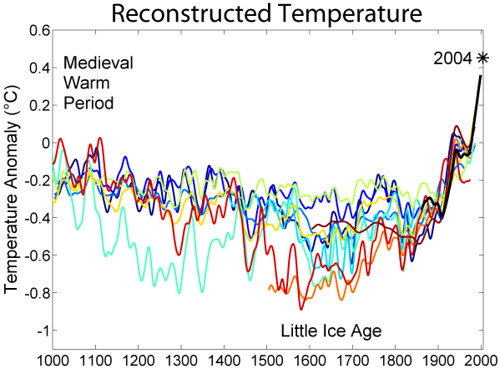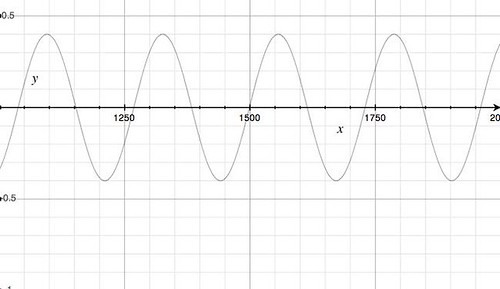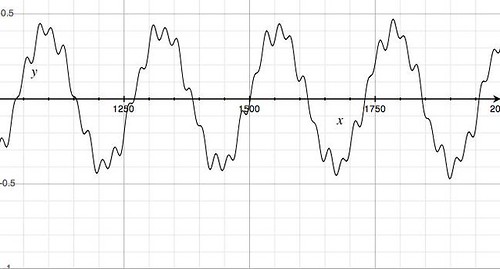Problems with global warming
Global warming claim: There is a consensus!
Fact: They use consensus as if they are to imply that all scientists agree with it. Clearly, that is untrue, with an increased number of scientists coming out against it. And when a conference brings in 600 scientists who overwhelmingly believe global warming is a threat, what kind of response would you expect? Think George W. Bush would be president if 600 Democrats got together to make such a selection?
But if we really want to be accurate, science has never been about the "consensus". Theory is all well and good, but quite simply, theory is not fact. More importantly, just because 4 out of every 5 experts believe something does not make it true. Or do you still believe that the Earth is flat too?
Claim: Deniers say that global cooling used to be used as a form of fear-mongering, but it was nothing more than media hype.
Fact: So global warming supporters does not utilize the media? On the contrary, the media has played a greater part in the spread of this theory than any scientist ever could. And while the noise may not have been as loud in the past, similar trends have been documented in the past, showing a regular two to three decade cycle in climate change. And yes, scientists did believe it; Newsweek even admits as much.
Claim: Well look at the last (50, 100, 200, 10000, million, whatever number) years. We can show that there has been warming over that period of time that can clearly be attributed to humans.
Fact: First off, accurate temperature records only extend back about a century and a half. Claims that temperature records go further back are somewhat misleading; they are nowhere near as accurate as today's records, nor as extensive. Still, let's give them the benefit of the doubt and say that the last 500 years of temperature records are accurate. Wikipedia displays the following image.

First off, note the black trend line. That shows actual differences from the suggested average. Again, note it only goes back 150 years. The trend going back from that black line is near linear. So clearly, it must've done the same for the 500 years before that as well.
Now lets consider just the last 150 years. If you take that data and extend it backward similarly, it would suggest that average temperatures have increased 4° C (at least 7° F) in the past millenium. See how easy a line works?
Now, we will consider a similar 150 year period of time, but take a look at this graph.

Look at the last 150 years. Somewhat similar to the graph produced by the scientists, but the years before that show a cyclical pattern. More realistically is the following graph, showing shorter periods within larger ones, building on the suggested couple decade long period.

While I cannot conclusively claim that these graphs are correct or even close to correct, neither can scientists with theirs. A simple understanding of statistics will tell you two things. First, you can do anything with numbers that you want; if you can suggest some sort of realistic trend, then it is easy enough to show why it may be true. And secondly (and more importantly), without accurate and consistently measured values, spread out randomly over the long run, then a trend cannot be trusted. Yeah, the trend of the past 150 years suggests warming; is that what happened before? How sure can we be since the mid-1800s was when the last mini-ice age ended?
Claim: Regardless, there is no doubt that global warming is real, is caused by humans, and is bad.
Fact: Global warming may very well exist; Venus and Earth both seem to suggest that a greenhouse effect does take place, as a planet without an atmosphere will be much cooler (and potentially warmer) at the extremes. But can it be proven that humans caused this? Well, what other possibilities may there be?
Plenty. Is it possible that the Earth's own heat production could vary and also increase temperatures? I haven't seen anything contrary to this, and would be interested to see some research there. Is it possible that the Sun could actually be more active right now, increasing temperatures? That is a definitive yes. One new theory already suggests that the Sun periodically enters increasing and decreasing periods of energy output. Moreover, it is very possible that a shorter period exists; we already know that the sunspot cycle (11 years) and magnetic oscillation cycle (22 years; interesting, in the 20-30 year period mentioned earlier) operate on a much shorter time period.
And is it bad? Average temperature increases are apparent based on data, but Antarctic ice seems to be getting thicker, certainly not supporting warmer temperatures there. Increased carbon dioxide levels are blamed, but greater levels of carbon dioxideare proven to be great for plants who feed on it almost the same way animals and humans live on oxygen. An increase of carbon dioxide could increase plant life and self-regulate the planet by taking that carbon dioxide and making it oxygen again. And just how solid are the numbers for increased sea levels? This may depend greatly on just where the warming occurs. Again, if more ice is being frozen into the Antarctic, it seems doubtful that sea levels could rise.
The fact is, global warming is not known to be fact. Enough noise though will make anyone believe anything. Good science suggests that any theory is falsifiable. The media and these "scientists" would have you believe global warming is not. This is bad theory, and bad science. When global warming is able to stand up for itself against other theories, and not needing to be defended, then global warming skeptics (myself included) will pay attention. Until then, keep that hot air in; you might just be aiding the global warming.
UPDATE 2/3 12:20 PM: CNS reports that the summary the UN found does not truly represent the scientific data.


<< Home